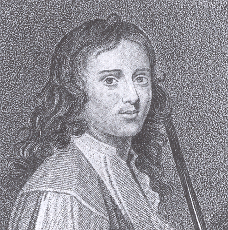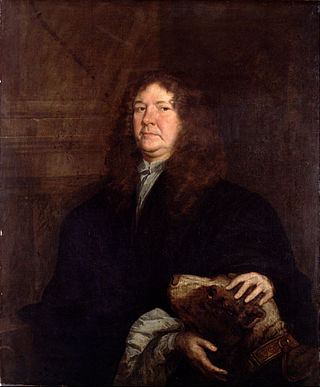Rollo Duke of Normandy, also known as The Bloody Brother, is a play written in collaboration by John Fletcher, Philip Massinger, Ben Jonson and George Chapman. The title character is the historical Viking duke of Normandy, Rollo. Scholars have disputed almost everything about the play; but it was probably written sometime in the 1612–24 era and later revised, perhaps in 1630 or after. In addition to the four writers cited above, the names of Nathan Field and Robert Daborne have been connected with the play by individual scholars.
The King's Men was the acting company to which William Shakespeare (1564–1616) belonged for most of his career. Formerly known as the Lord Chamberlain's Men during the reign of Queen Elizabeth I, they became the King's Men in 1603 when King James I ascended the throne and became the company's patron.

Edward Kynaston was an English actor, one of the last Restoration "boy players", young male actors who played women's roles.

Thomas Killigrew was an English dramatist and theatre manager. He was a witty, dissolute figure at the court of King Charles II of England.

Michael Mohun was a leading English actor both before and after the 1642–60 closing of the theatres.
Charles Hart was a prominent British Restoration actor.

A boy player was a male child or teenager who performed in Medieval and English Renaissance playing companies. Some boy players worked for adult companies and performed the female roles, since women were not allowed to perform on the English stage during this period. Others worked for children's companies in which all roles, not just the female ones, were played by boys.
Joseph Taylor was a 17th-century English actor. As the successor of Richard Burbage as the leading actor with the King's Men, he was arguably the most important actor in the later Jacobean and the Caroline eras.
Richard Robinson was an actor in English Renaissance theatre and a member of Shakespeare's company the King's Men.

The Duke's Company was a theatre company chartered by King Charles II at the start of the Restoration era, 1660. Sir William Davenant was manager of the company under the patronage of Prince James, Duke of York. During that period, theatres began to flourish again after they had been closed from the restrictions throughout the English Civil War and the Interregnum. The Duke's Company existed from 1660 to 1682, when it merged with the King's Company to form the United Company.
George Jolly, or Joliffe was an actor, an early actor-manager and a theatre impresario of the middle seventeenth century. He was "an experienced, courageous, and obstinate actor-manager" who proved a persistent rival for the main theatrical figures of Restoration theatre, Sir William Davenant and Thomas Killigrew.
Thomas Pollard was an actor in the King's Men – a prominent comedian in the acting troupe of William Shakespeare and Richard Burbage.
King's Men personnel were the people who worked with and for the Lord Chamberlain's Men and the King's Men from 1594 to 1642. The company was the major theatrical enterprise of its era and featured some of the leading actors of their generation – Richard Burbage, John Lowin, and Joseph Taylor among other – and some leading clowns and comedians, like Will Kempe and Robert Armin. The company benefitted from the services of William Shakespeare, John Fletcher, and Philip Massinger as regular dramatists.
Richard Baxter, or Backster, was a seventeenth-century actor, who worked in some of the leading theatre companies of his era. His long career illustrates the conditions during the difficult years of transition from the period of English Renaissance theatre, through the English Civil War and the Interregnum, and into the Restoration era.
Nicholas Burt, or Birt or Burght among other variants, was a prominent English actor of the seventeenth century. In a long career, he was perhaps best known as the first actor to play the role of Othello in the Restoration era.
Robert Shatterell was an English actor of the seventeenth century. He was one of the limited group of actors who began their careers in the final period of English Renaissance theatre, and resumed stage work in the Restoration, after the long theatre closure of the English Civil War and the Interregnum, 1642–1660. [See: Richard Baxter; Nicholas Burt; Walter Clun; Charles Hart; Michael Mohun; William Wintershall.]
William Wintershall, also Wintersall or Wintersell, was a noted seventeenth-century English actor. His career spanned the difficult years of mid-century, when English theatres were closed from 1642 to 1660, during the English Civil War and the Interregnum.
Alexander Gough, also Goughe or Goffe, was an English actor in the Caroline era. He started out as a boy player filling female roles; during the period of the English Civil War and the Interregnum (1642–1660) when the theatres were closed and actors out of work, Gough became involved in the publication of plays.

William Cartwright was an English actor of the seventeenth century, whose career spanned the Caroline era to the Restoration. He is sometimes known as William Cartwright, Junior or William Cartwright the younger to distinguish him from his father, another William Cartwright, an actor of the previous generation.
Anne Marshall, also Mrs. Anne Quin, was a leading English actress of the Restoration era, one of the first generation of women performers to appear on the public stage in England.




